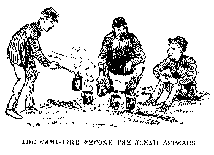|
The encampment..was made very nice and cleanly and healthy by the
removal of all rubbish and decaying vegetation. It was laid out city
fashion, into company streets, by the formation of the tents into
straight and regular rows. Up to this time, we used the "Sibley tent."
Major H.. Sibley, formerly of the U. S. Army, but during the war of the
Rebellion a Brig.-Gen. in the Confederate Army, was the inventor of
this huge and cumbrous tent. When stretched, the tent was conical in
shape. The lower edge or base was a circle fastened to the ground by
wooden pins. The top or apex was held perpendicular to the base or
ground by an upright central pole set into an iron tripod. An aperture
was left on the side next to the street for a doorway, with wide edges
extending over each other for the purpose of opening and closing. The
apex was left open for the smoke from the fire, upon the ground in the
centre beneath the tripod, to ascend and disappear in the clouds. These
tents would hold from twenty-five to thirty men, who slept upon the
ground beneath them with their heads to the circumference and their
feet to the center.
In
the Regiment were some very good singers. While we were encamped here,
our hearts were cheered by the voice of song around the camp fires in
these tents. The songs were mostly of home and country. Often here, and
on the long weary marches of subsequent campaigns, we reminded each
other in song that,
"John Brown's body lies mouldering in the ground,

As we go marching on."
"The sour apple trees" were far from being enough to "hang Jeff. Davis on" if he had been hung as often
as we repeated the words in rhyme.
The inspiring song of
"Rally round the flag, boys;
Rally once again,
Shouting the battle cry of Freedom!"
And the rhythm of

"Tramp, tramp, tramp, the boys are marching."
were sung with a vim, that filled the air with music and almost
shook the ground with the cadence of song. As we looked back at the vacant chair at home, we sang:
"Do they miss me at home, do they miss me?"
And as we looked forward to the battles before us, we sang:
"Just before the battle, mother,
I am thinking dear, of you."
And as we made a night raid upon the sutler's tent, we sang:
"We're coming, Father Abraham, 600,000 strong!"
After
the lapse of a quarter century, taking a retrospective view of the men
who sang with us at the camp fires of Murfreesboro, many of whom died
there of disease, and others afterwards died in prisons and moved over
battle-fields crimsoned with their own blood, the deathless elegy,
written by Theodore O'Hara in commemoration of the Kentuckians who were
killed in the Mexican war, seems very appropriate and applicable here:
The Bivouac of the Dead
The muffled drum's sad roll has beat
The soldier's last tattoo;
No more on life's parade shall meet
The brave and daring few.
On Fame's eternal camping-ground
Their silent tents are spread,
And glory guards with solemn round
The bivouac of the
dead.
No answer of the foe's advance
Now swells upon the wind;
No troubled thought at midnight haunts
Of loved ones left behind;
No vision of the morrow's strife
The warrior's dream alarms;
No braying horn nor screaming fife
At dawn shall call to arms.
Their shivered swords are red with rust,
Their plumed heads are bowed;
Their haughty banner trailed in dust
Is now their martial shroud,
And plenteous funeral tears have washed
The red stains from each brow,
And their proud forms in battle gashed
Are free from anguish now.
The neighing steed, the flashing blade,
The trumpet's stirring blast,
The charge, the dreadful cannonade,
The din and shout are past;
Nor war's wild note, nor glory's peal,
Shall thrill with fierce delight
Those breasts that never more shall feel
The rapture of the fight.
Like the dread northern hurricane
That sweeps his broad plateau,
Flushed with the triumph yet to gain,
Came down the serried foe;
Our heroes felt the shock, and leapt
To meet them on the plain;
And long the pitying sky hath wept
Above our gallant slain.
Rest on, embalmed and sainted dead!
Dear as the blood you gave,
No impious footsteps here shall tread
The herbage of your grave;
Nor shall your glory be forgot
While Fame her record keeps,
Or Honor points the hallowed spot
Where Valor proudly sweeps.
Yon marble minstrel's voiceful stone
In deathless songs shall tell,
When many a vanished age hath flown,
The story how you fell;
Nor wreck, nor change, nor winter's blight,
Nor Time's remorseless doom,
Shall dim one ray of holy light
That gilds your glorious tomb.

|

